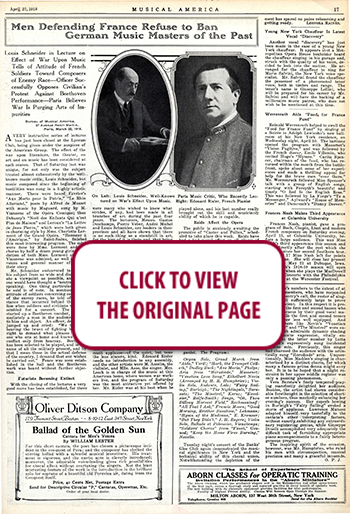 100 YEARS AGO IN MUSICAL AMERICA (240)
100 YEARS AGO IN MUSICAL AMERICA (240)
April 27, 1918
Page 17
Men Defending France Refuse to Ban German Music Masters of the Past
Louis Schneider in Lecture on Effect of War Upon Music Tells of Attitude of French Soldiers Toward Composers of Enemy Race—Officer Successfully Opposes Civilian’s Protest Against Beethoven Performance—Paris Believes War Is Purging Arts of Impurities
Bureau of Musical America, 27 Avenue Henri Martin, Paris, March 22, 1918.
A VERY instructive series of lectures has just been closed at the Lyceum Club, being given under the auspices of the American Group. The effect of the war upon literature, the theater, on art and on music has been considered at each séance. That of Saturday last was unique, for not only was the subject treated almost exhaustively by the well-known music critic, Louis Schneider, but music composed since the beginning of hostilities was sung in a highly artistic manner. There were heard Février’s “Aux Morts pour la Patrie,” “Le Rhin Allemand,” poem by Alfred de Musset with music by Maguard, sung by M. Viannenc of the Opéra Comique; then Debussy’s “Noël des Enfants Qui n’ont Plus de Maison” and Leroux’s “La Lettre de Jean Pierre,” which were both given in charming style by Mme. Charlotte Lormont of the Grand Opéra. “Honneur à l’Amérique,” by Saint-Saëns, finished this most interesting program. The solos were done by Mme. Lormont and the chorus by half a dozen young girls. The diction of both Mme. Lormont and Mr. Viannenc was admired, as well as their voices and general manner of telling their story.
Mr. Schneider endeavored to handle his subject from as wide and dispassionate a viewpoint as possible, and often one would have thought a “neutral” were speaking. One thing particularly that he said is of note. In mentioning the attitude of soldiers concerning composers of the enemy races, he told of an instance that occurred behind the firing line when soldiers and civilians were assembled for a concert. The pianist started up a Beethoven number, and immediately a man in the audience began to hiss and object. An officer, decorated, jumped up and cried: “We that are bearing the brunt of fighting have the right to demand what pleases us, not one who sits at home and knows of the conflict only from hearsay. Beethoven has been selected to be played, and in the name of all the military present, and by that I mean those in the actual defense of the country, I demand that our wishes be carried out.” Peace was soon established in the hall and the Beethoven work was beard without further objection.
Futurists Becoming Extinct
With the closing of the lectures a very good move has been established, for there were many who wished to know what strides, if any, had been made in all branches of art during the past four years. The lecturers, Messrs. Gaston Deschamps, Piene Veber, André Michel and Louis Schneider, are leaders in their province and all have shown that there is no such thing as a standstill in art, for the love of it is there and, that being the case, we may be sure that it is living during these troublous times and will be revived later. It is the opinion of deep thinkers that the war is purging fine arts of a scum that seems to arise during every epoch. During the past few years the work of the freak musician or painter has disappeared and we hear almost nothing that is “ultra-modern.” The futurist painters have shown how useful and ingenious they can be in doing camouflage scenery, and undoubtedly when they return home at the cessation of hostilities, they will leave such talent behind—with so-called futurist music.
To return to the last conference, many people high in Paris talent life were there, among others Mrs. Sharp, wife of the American Ambassador; Xavier Leroux, Henri Février, Noti, Campbell-Tipton, Sylvio Lazzari.
Edouard Risler was pianist at an informal musicale given at the “Hostess’ House” in the former Hotel Petrograd, Saturday evening. The audience was largely composed of women, but that did not make it less impressionable, and Mr. Risler and his associates received much applaus—of the quiet, but·none the less sincere, kind. Edouard Risler needs no introduction to any assembly, and the other artists were M. Asselin, the violinist, and Mlle. Asso, the singer. Mrs. Leech is in charge of the music at this American home, where women war workers live, and the program of Saturday was the most attractive yet offered by her. Mr. Risler was at his best when he played alone, and his last number really brought out the skill and musicianly ability of which he is capable.
Raids Affect the Opera
The public is anxiously awaiting the première of “Castor and Pollux,” scheduled to take place this week. Raids have had a bad moral effect on all places of amusement and the Grand Opéra, which for years has had a hard road to travel, is “up against it.” Raids generally arrive between nine and ten in the evening, and people prefer to be home at that hour, else be caught in the center of the town with no way of reaching one’s house without walking. I am told that the new opera will be perfect in every detail and certainly the management has spared no pains rehearsing and getting ready. —LEONORA RAINES




 RENT A PHOTO
RENT A PHOTO





